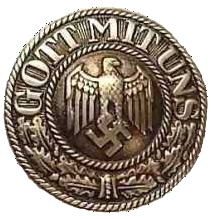Chapter VI
The First Period Of Our Struggle
THE ECHOES OF OUR FIRST GREAT MEETING, IN THE BANQUET HALL OF THE HOFBRÄU HAUS on February 24th, 1920, had not yet died away when we began preparations for our next meeting. Up to that time we had to consider carefully the venture of holding a small meeting every month or at most every fortnight in a city like Munich; but now it was decided that we should hold a mass meeting every week. I need not say that we anxiously asked ourselves on each occasion again and again: Will the people come and will they listen? Personally I was firmly convinced that if once they came they would remain and listen.
During that period the hall of the Hofbräu Haus in Munich acquired for us, National Socialists, a sort of mystic significance. Every week there was a meeting, almost always in that hall, and each time the hall was better filled than on the former occasion, and our public more attentive.
Starting with the theme, 'Responsibility for the War,' which nobody at that time cared about, and passing on to the discussion of the peace treaties, we dealt with almost everything that served to stimulate the minds of our audience and make them interested in our ideas. We drew attention to the peace treaties. What the new movement prophesied again and again before those great masses of people has been fulfilled almost in every detail. To-day it is easy to talk and write about these things. But in those days a public mass meeting which was attended not by the small bourgeoisie but by proletarians who had been aroused by agitators, to criticize the Peace Treaty of Versailles meant an attack on the Republic and an evidence of reaction, if not of monarchist tendencies. The moment one uttered the first criticism of the Versailles Treaty one could expect an immediate reply, which became almost stereotyped: 'And Brest-Litowsk?' 'Brest-Litowsk!' And then the crowd would murmur and the murmur would gradually swell into a roar, until the speaker would have to give up his attempt to persuade them. It would














